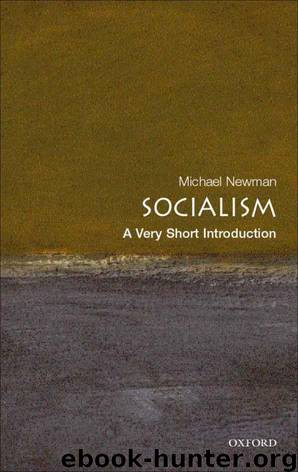Socialism: A Very Short Introduction (Very Short Introductions) by Newman Michael

Author:Newman, Michael [Newman, Michael]
Language: eng
Format: mobi, epub
Publisher: Oxford University Press
Published: 2005-07-27T16:00:00+00:00
Chapter 3
New Lefts – enrichment and fragmentation
During the third quarter of the 20th century, there was a gradual erosion of the dominance of communism and social democracy over concepts of socialism, leading to the emergence of a ‘New Left’: 1956 is often taken as the pivotal date in this process. In the case of communism, the reasons are quite evident: after having denounced Stalin’s brutal repression at the Soviet Party Congress in February, Nikita Krushchev, the Soviet leader, initiated an invasion of Hungary in November in order to ensure its continued adherence to the Soviet-dominated bloc. These two events led to an unprecedented exodus of Communist Party members, particularly in Western Europe, and gradually undermined Moscow’s control of world communism. This was reinforced by the sharp deterioration in relations between the Soviet Union and China leading, during the 1960s, to ‘Maoism’ mounting a challenge to communist orthodoxy. In the case of social democracy, there was no similar cataclysm, because there was no equivalent centre, and each national party followed its own trajectory. In fact, it may be argued that the real crisis for social democracy arose much later with the stalled growth and increasing impact of economic internationalization from the 1970s, and this will be discussed in the next chapter.
However, the crisis of communism was also bound to affect social democracy, for Moscow had been the centre of Marxist thought since 1917 and the Cold War had reinforced this tendency. Dissident ex-communists now encouraged a renewed interest in Marxism from those on the left who had never wanted to associate themselves with the Soviet Union. Others who rejected social democracy as too timid were drawn to new forms of extra-parliamentary politics that challenged existing theories and practices across a whole range of activity. The emergence of this New Left culminated in another historical ‘moment’: 1968, when student-led movements unleashed protests against established authority across much of the world, most notably in France.
The New Left was never a coherent movement, but was rather a shorthand for a whole range of ideas and tendencies that fell outside the dominant traditions. A shared assumption of both communists and social democrats had been the primacy of the organized working class and this was now called into question in both theory and practice. Marxists thinkers, who rejected the orthodox emphasis on economics, also became influential in the New Left. In particular, the Frankfurt School, which had always emphasized the importance of consciousness rather than class as the source of social transformation, was rediscovered, and Herbert Marcuse (1898–1979) became particularly important. In Eros and Civilisation (1955) he drew on Marx and Freud to argue in favour of both social and sexual liberation, while in One Dimensional Man (1964) he argued that the working class had become entirely integrated into advanced industrial society. Revolutionary transformation would now depend on ‘outsiders’, including ethnic minorities and radical intellectuals. Although his work was often obscure, its ‘message’ was in harmony with the movements of 1968. Battling against existing power structures
Download
Socialism: A Very Short Introduction (Very Short Introductions) by Newman Michael.epub
This site does not store any files on its server. We only index and link to content provided by other sites. Please contact the content providers to delete copyright contents if any and email us, we'll remove relevant links or contents immediately.
| Anarchism | Communism & Socialism |
| Conservatism & Liberalism | Democracy |
| Fascism | Libertarianism |
| Nationalism | Radicalism |
| Utopian |
The Secret History by Donna Tartt(19039)
The Social Justice Warrior Handbook by Lisa De Pasquale(12185)
Thirteen Reasons Why by Jay Asher(8887)
This Is How You Lose Her by Junot Diaz(6874)
Weapons of Math Destruction by Cathy O'Neil(6263)
Zero to One by Peter Thiel(5786)
Beartown by Fredrik Backman(5737)
The Myth of the Strong Leader by Archie Brown(5496)
The Fire Next Time by James Baldwin(5429)
How Democracies Die by Steven Levitsky & Daniel Ziblatt(5211)
Promise Me, Dad by Joe Biden(5141)
Stone's Rules by Roger Stone(5080)
A Higher Loyalty: Truth, Lies, and Leadership by James Comey(4948)
100 Deadly Skills by Clint Emerson(4917)
Rise and Kill First by Ronen Bergman(4777)
Secrecy World by Jake Bernstein(4739)
The David Icke Guide to the Global Conspiracy (and how to end it) by David Icke(4699)
The Farm by Tom Rob Smith(4501)
The Doomsday Machine by Daniel Ellsberg(4484)
